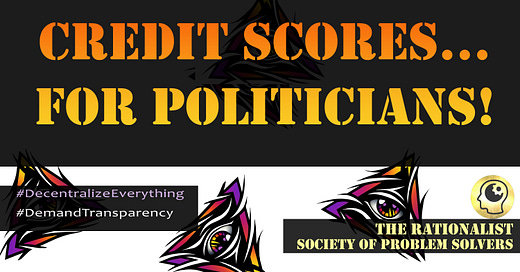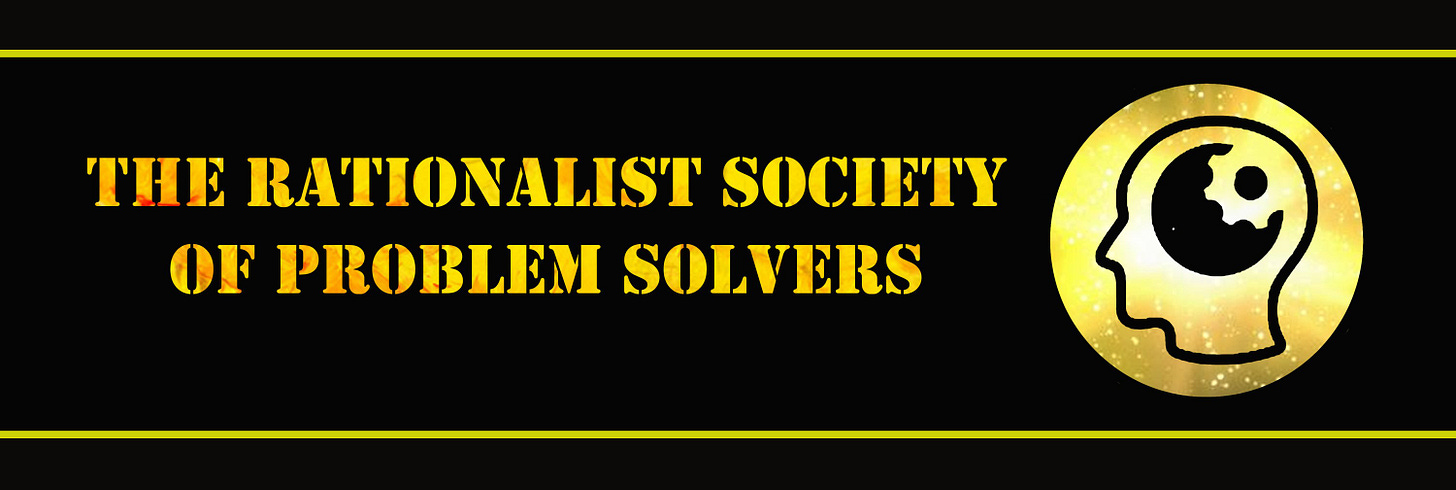We have all heard of them by now: Social Credit Scores.
These totalitarian systems originated in China as a digital way to evaluate and rank citizens based on their behavior and actions in society.
With the rise of DEI corporations (Diversity, Equity and Inclusion), it has become painfully obvious that the unified push coming from Global Wall Street has a specific goal - backdoor acceptance into a social credit system.
Freedom-loving citizens worldwide are terrified of these social credit systems - and rightfully so. Imagine going to buy meat or gas and your credit card doesn’t work because you have reached your carbon limit. Or imagine trying to buy bullets, or contraceptives, or donating to a political party and being punished for your actions.
The potential for abuse here by centralized monolithic entities is enormous. But we shouldn't fear technology just because it can be used as a weapon against us. Instead, we should wield its power as a weapon against the corruption happening in our systems. And that starts clearly and squarely with our representatives.
Imagine instead of using a social credit score system on the citizens, we the citizens used it on the people who affect (and have the opportunity to corrupt) our systems. People like the politicians, their donors, the CDC, FDA, and all the other three letter agencies. Imagine if we built a decentralized, transparent and constantly evolving system that did everything from tracking the lies our politicians told us, to providing a safe haven for whistleblowers to drop evidence into.
The use of social credit scores back onto politicians could be a way to hold them accountable for their actions and behaviors in office. Just like with individuals, social credit scores for politicians could be based on a set of criteria that evaluates their performance, integrity, and adherence to our set of standards.
Imagine if politicians had all of their actions posted neatly under their profile. Picture all of the campaign promises they make and run on listed here, all the bills they vote on, all of the positions they take, and more. Voters would be able to see conflicts of interest, and any time the politicians acted in secrecy or in a way that opened them up to corruption. This would help give voters the most transparent look possible at all of the candidates. Politicians would be graded on their actions by the voters in their districts in a decentralized way - maybe in a similar way to how eBay or Amazon users rate products or sellers.
For starters, we absolutely should already be evaluating and scrutinizing the voting records of representatives. Their social credit scores should reflect their consistency with their stated policies, their responsiveness to their constituents' needs, and their willingness to work collaboratively with other legislators and the voters.
They should also be graded on their public statements and conduct, including their social media activity, public speeches, availability to constituents, how they interact with their constituents, and behavior during public appearances. Their scores could reflect their adherence to professional conduct and civility, as well as their ability to communicate clearly, effectively, and honestly.
Politicians especially should be evaluated based on their transparency with finances and their compliance with things such as campaign finance laws. Do they openly list the sources and amounts of their campaign contributions? Do they take money from companies their constituents disagree with? Their scores should reflect this transparency and accountability, thus reducing the influence of money in politics. The politicians who openly reject large and unpopular donors should score higher.
Overall, the use of social credit scores on politicians could be a way to incentivize them to act in the public interest and maintain high ethical standards. However, it would require careful consideration and oversight to ensure that this system - like so many others - doesn’t also become corrupted.
We have written about digital systems for self governance several other times, and have shared some pretty exciting ways to make our new systems resistant to corruption. Some of those articles can be found here, here, here, or here.
And that’s just a few of them. If you care about better self governance, transparency in government, and especially ending the corruption in the systems that govern over our lives, we hope you will join us on this quest.
Subscribe. It is 100% free and always will be. We are going to find our way out of this mess. And it will be a lot easier the more of us that work together.
Do you hunger for solutions?
As always the entire purpose of this is to connect with other solutions-minded people like yourself! For 4 billion years on this planet there were only single-celled organisms. Then one day they somehow learned to work together and make complex multi-celled creatures like you and me. Right now we are like those single-celled organisms. Our next evolution is finding how to work together, better (like we wrote about here).
If you enjoyed this explore some other awesome topics with us such as the articles here, here, and here.
COMMENTS ARE FOR EVERYONE AS A PLACE TO THINK TANK SOLUTIONS. They will never be for paid-only subscribers and we will never charge a subscription.
#KillCorruption #UnifyAgainstCorruption #ResultsMatterMost #DecentralizeEverything #DemandTransparency






OOH make it a freedom score...wait a minute they already have it...conservative vote rankings.
I say let's create a website, put all the social credit scores on the internet and beat them to the punch?
Can you do it please?
I think this is a great idea (better than the one I had of just putting their name and criminal activity on a website!) but how can this be done? If anyone so much as slips up and gets tracked to the real person they will suffer dire consequences such as having their bank account suddenly disappeared! The corruption is to deep at this point. There are numerous bills in the works against encrypted communications that will certainly be enacted and we will not be able to stop that either since they do what they want no matter the protest against it. Maybe if we start slowly building into a full blown platform (using Rumble? I don't think Substack has the means but..) the first foot in gets the wettest!